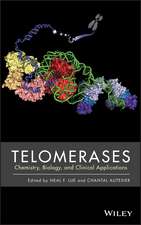Genomics Protocols: Methods in Molecular Biology, cartea 439
Editat de Mike Starkey, Ramnath Elaswarapuen Limba Engleză Paperback – 10 dec 2010
Expansive and current, Genomics Protocols, 2nd Edition is the perfect update for researchers working in this integral, growing field.
| Toate formatele și edițiile | Preț | Express |
|---|---|---|
| Paperback (1) | 739.62 lei 39-44 zile | |
| Humana Press Inc. – 10 dec 2010 | 739.62 lei 39-44 zile | |
| Hardback (1) | 589.52 lei 39-44 zile | |
| Humana Press Inc. – 25 feb 2008 | 589.52 lei 39-44 zile |
Din seria Methods in Molecular Biology
- 9%
 Preț: 791.63 lei
Preț: 791.63 lei - 23%
 Preț: 598.58 lei
Preț: 598.58 lei - 20%
 Preț: 882.98 lei
Preț: 882.98 lei -
 Preț: 252.05 lei
Preț: 252.05 lei - 5%
 Preț: 802.70 lei
Preț: 802.70 lei - 5%
 Preț: 729.61 lei
Preț: 729.61 lei - 5%
 Preț: 731.43 lei
Preț: 731.43 lei - 5%
 Preț: 741.30 lei
Preț: 741.30 lei - 5%
 Preț: 747.16 lei
Preț: 747.16 lei - 15%
 Preț: 663.45 lei
Preț: 663.45 lei - 18%
 Preț: 1025.34 lei
Preț: 1025.34 lei - 5%
 Preț: 734.57 lei
Preț: 734.57 lei - 18%
 Preț: 914.20 lei
Preț: 914.20 lei - 15%
 Preț: 664.61 lei
Preț: 664.61 lei - 15%
 Preț: 654.12 lei
Preț: 654.12 lei - 18%
 Preț: 1414.74 lei
Preț: 1414.74 lei - 5%
 Preț: 742.60 lei
Preț: 742.60 lei - 20%
 Preț: 821.65 lei
Preț: 821.65 lei - 18%
 Preț: 972.30 lei
Preț: 972.30 lei - 15%
 Preț: 660.49 lei
Preț: 660.49 lei - 5%
 Preț: 738.41 lei
Preț: 738.41 lei - 18%
 Preț: 984.92 lei
Preț: 984.92 lei - 5%
 Preț: 733.29 lei
Preț: 733.29 lei -
 Preț: 392.60 lei
Preț: 392.60 lei - 5%
 Preț: 746.26 lei
Preț: 746.26 lei - 18%
 Preț: 962.66 lei
Preț: 962.66 lei - 23%
 Preț: 860.22 lei
Preț: 860.22 lei - 15%
 Preț: 652.64 lei
Preț: 652.64 lei - 5%
 Preț: 1055.50 lei
Preț: 1055.50 lei - 23%
 Preț: 883.87 lei
Preț: 883.87 lei - 19%
 Preț: 491.89 lei
Preț: 491.89 lei - 5%
 Preț: 1038.86 lei
Preț: 1038.86 lei - 5%
 Preț: 524.16 lei
Preț: 524.16 lei - 18%
 Preț: 2122.34 lei
Preț: 2122.34 lei - 5%
 Preț: 1299.23 lei
Preț: 1299.23 lei - 5%
 Preț: 1339.12 lei
Preț: 1339.12 lei - 18%
 Preț: 1390.26 lei
Preț: 1390.26 lei - 18%
 Preț: 1395.63 lei
Preț: 1395.63 lei - 18%
 Preț: 1129.65 lei
Preț: 1129.65 lei - 18%
 Preț: 1408.26 lei
Preț: 1408.26 lei - 18%
 Preț: 1124.92 lei
Preț: 1124.92 lei - 18%
 Preț: 966.27 lei
Preț: 966.27 lei - 5%
 Preț: 1299.99 lei
Preț: 1299.99 lei - 5%
 Preț: 1108.51 lei
Preț: 1108.51 lei - 5%
 Preț: 983.76 lei
Preț: 983.76 lei - 5%
 Preț: 728.16 lei
Preț: 728.16 lei - 18%
 Preț: 1118.62 lei
Preț: 1118.62 lei - 18%
 Preț: 955.25 lei
Preț: 955.25 lei - 5%
 Preț: 1035.62 lei
Preț: 1035.62 lei - 18%
 Preț: 1400.35 lei
Preț: 1400.35 lei
Preț: 739.62 lei
Preț vechi: 960.54 lei
-23% Nou
Puncte Express: 1109
Preț estimativ în valută:
141.53€ • 151.34$ • 118.00£
141.53€ • 151.34$ • 118.00£
Carte tipărită la comandă
Livrare economică 14-19 aprilie
Preluare comenzi: 021 569.72.76
Specificații
ISBN-13: 9781617378188
ISBN-10: 1617378186
Pagini: 444
Ilustrații: XV, 425 p. 115 illus., 4 illus. in color.
Dimensiuni: 155 x 235 x 23 mm
Greutate: 0.66 kg
Ediția:Softcover reprint of hardcover 2nd ed. 2008
Editura: Humana Press Inc.
Colecția Humana
Seria Methods in Molecular Biology
Locul publicării:Totowa, NJ, United States
ISBN-10: 1617378186
Pagini: 444
Ilustrații: XV, 425 p. 115 illus., 4 illus. in color.
Dimensiuni: 155 x 235 x 23 mm
Greutate: 0.66 kg
Ediția:Softcover reprint of hardcover 2nd ed. 2008
Editura: Humana Press Inc.
Colecția Humana
Seria Methods in Molecular Biology
Locul publicării:Totowa, NJ, United States
Public țintă
Professional/practitionerCuprins
Whole Genome Amplification with Phi29 DNA Polymerase to Enable Genetic or Genomic Analysis of Samples of Low DNA Yield.- Scanning for DNA Variants by Denaturant Capillary Electrophoresis.- Identification of SNPs, or Mutations in Sequence Chromatograms.- BeadArray-Based Genotyping.- Microsatellite-Based Candidate Gene Linkage Analysis Studies.- Full Complexity Genomic Hybridization on 60-mer Oligonucleotide Microarrays for Array Comparative Genomic Hybridization (aCGH).- Detection of Copy Number Changes at Multiple Loci in DNA Prepared from Formalin-Fixed, Paraffin-Embedded Tissue by Multiplex Ligation-Dependent Probe Amplification.- Application of Microarrays for DNA Methylation Profiling.- Genomewide Identification of Protein Binding Locations Using Chromatin Immunoprecipitation Coupled with Microarray.- Transcriptional Profiling of Small Samples in the Central Nervous System.- Quantitative Expression Profiling of RNA from Formalin-Fixed, Paraffin-Embedded Tissues Using Randomly Assembled Bead Arrays.- Expression Profiling of microRNAs in Cancer Cells: Technical Considerations.- Identification of Disease Biomarkers by Profiling of Serum Proteins Using SELDI-TOF Mass Spectrometry.- The Applicability of a Cluster of Differentiation Monoclonal Antibody Microarray to the Diagnosis of Human Disease.- Protein Profiling Based on Two-Dimensional Difference Gel Electrophoresis.- Quantitative Protein Profiling by Mass Spectrometry Using Isotope-Coded Affinity Tags.- Quantitative Protein Profiling by Mass Spectrometry Using Label-Free Proteomics.- Using 2D-LC-MS/MS to Identify Francisella tularensis Peptides in Extracts from an Infected Mouse Macrophage Cell Line.- Baculovirus Expression Vector System: An Emerging Host for High-Throughput Eukaryotic Protein Expression.- Coimmunoprecipitation and Proteomic Analyses.- Tandem Affinity Purification Combined with Mass Spectrometry to Identify Components of Protein Complexes.- Mammalian Two-Hybrid Assay for Detecting Protein-Protein Interactions in Vivo.- Detection of Protein-Protein Interactions in Live Cells and Animals with Split Firefly Luciferase Protein Fragment Complementation.- Subcellular Localization of Intracellular Human Proteins by Construction of Tagged Fusion Proteins and Transient Expression in COS-7 Cells.- GeneFAS: GeneFAS: A Tool for the Prediction of Gene function Using Multiple Sources of Data.- Comparative Genomics-Based Prediction of Protein Function.- Design, Manufacture, and Assay of the Efficacy of siRNAs for Gene Silencing.
Recenzii
From the reviews of the second edition:
"The main purpose is to present current protocols in genomic research, and the book provides a comprehensive update on this area of research … . The book is written primarily for scientists in the field of genomic research. … presents a good balance between the different aspects involved in the study of functional genomics. It also provides a number of updated protocols for practicing investigators in the field of genomic research. … a valuable companion to all researchers in the field of genomic research." (Ruben Mestril, Doody’s Review Service, January, 2009)
"The main purpose is to present current protocols in genomic research, and the book provides a comprehensive update on this area of research … . The book is written primarily for scientists in the field of genomic research. … presents a good balance between the different aspects involved in the study of functional genomics. It also provides a number of updated protocols for practicing investigators in the field of genomic research. … a valuable companion to all researchers in the field of genomic research." (Ruben Mestril, Doody’s Review Service, January, 2009)
Textul de pe ultima copertă
Since the first edition, published in 2001, genomics research has taken great strides. In Genomics Protocols, 2nd Edition, a team of expert researchers share the most current information in a field that has recently switched emphasis from gene identification to functional genomics and the characterization of genes and gene products. This volume approaches its complex subject with a broad perspective to supply its reader with a vital overview of genomics and its derivative fields, with a focus on pivotal issues such as data analysis. Following the highly successful Methods in Molecular Biology™ series format, the chapters provide easy-to-follow laboratory protocols, lists of the necessary materials, and the excellent Notes section, which offers tips on troubleshooting and avoiding known pitfalls.
Expansive and current, Genomics Protocols, 2nd Edition is the perfect update for researchers working in this integral, growing field.
Expansive and current, Genomics Protocols, 2nd Edition is the perfect update for researchers working in this integral, growing field.
Caracteristici
Unparalleled diversity of technologies covered in a single volume Supplies the reader with a vital overview of genomics and its derivative fields, with a focus on pivotal issues such as data analysis Excellent Notes section, which offers tips on troubleshooting and avoiding known pitfalls Includes supplementary material: sn.pub/extras









